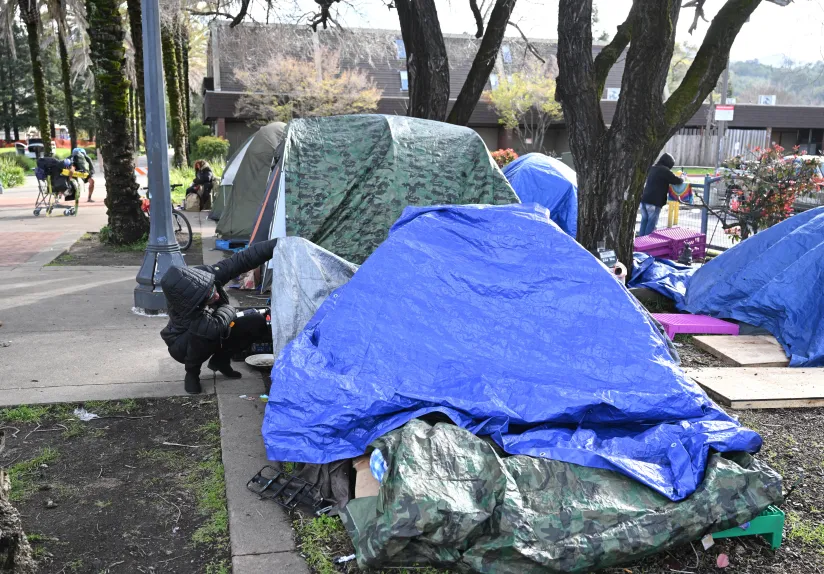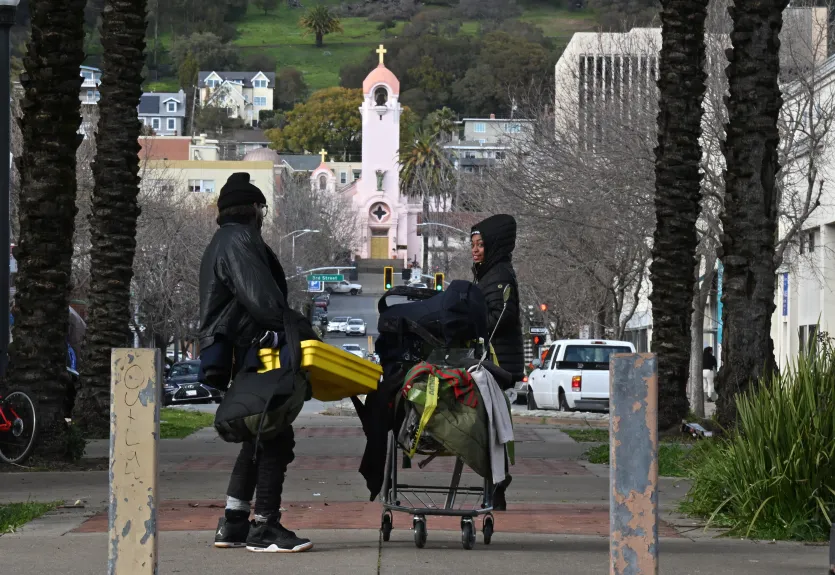“While we agree that the city can legally limit camping in certain and limited public areas, we urge the city to meaningfully adopt solutions that puts an end to sweeps and camp closures,” she said.
Jason Sarris, who used to be homeless and continues to advocate for the community, said that by closing the camp without having a transition plan, the city is “kicking the proverbial can down the road.”
“Where are these people going to go in the meantime?” he said. “They’re going to congregate at another public property. If you keep on closing parks and closing off public property, then you’re definitely flirting with violating Martin v. Boise.”
The city said the rules comply with federal case law set by the 2018 ruling in the Martin v. Boise case. The U.S. 9th Circuit Court of Appeals decision prohibits agencies from restricting people from sleeping on public lands if no adequate shelter space is available for them. Such bans would essentially make it unlawful for a person to sleep anywhere and would thus constitute cruel and unusual punishment in violation of the U.S. Constitution, the court found.
The city said the Martin v. Boise ruling still allows for reasonable limitations on camping, including environmental and public safety protections.
The council supported the ban, but voiced frustration over the continued problem around homelessness.
“How sad that we’re having this conversation,” Vice Mayor Maika Llorens Gulati said. She said that the city has invested so much time and money into housing and resources for the homeless.
“What else can we do in terms of, like, tenant protection?” she said. “It’s not going to get any better. I mean, I just don’t see that path.”
Councilmember Rachel Kertz said officials have to continue leading with dignity and compassion.
“We have lives on the line who are in our community,” Kertz said. She said officials need to continue efforts toward supportive housing and work with other agencies and organizations to get it done.
“We need to partner with everyone and figure out how to support the community,” Kertz said.
The discussion comes as the city is taking steps to develop an interim-housing shelter program. The concept has been proposed as the next phase of the city’s homeless strategy, following the closure of a city-sanctioned camp in a commuter lot under Highway 101.
Meanwhile, in a lawsuit filed Wednesday, residents of the camp said weather forecasters expect a strong storm Monday and unsettled weather for the next couple of weeks.
“We all face serious danger, because we will get soaked trying to move in the rain,” the suit says. “Once we get wet, we can’t get dry. Once we get wet, we will have to endure near freezing temperatures at night. The extreme cold can result in hypothermia, pneumonia, extreme emotional distress.”
Judge Yvonne Gonzalez Rogers of the U.S. District Court for the Northern District of California approved the order against the city at the request of the group. The plaintiffs — Deanna Hughes, Kachina Moncrief, Jerome Wade, Gerald Kinsel, Caroline Coats and Floyd Barrow — are representing themselves.
Rogers found that the National Weather Service is issuing warnings of “heavy rains, strong winds, and possible flooding.”
“As courts have observed in similar cases, plaintiffs raise serious questions that the government will violate their constitutional rights, placing them in danger by forcing them to move during severe weather,” Rogers wrote.
When asked for comment, city officials emailed a statement to the Independent Journal that they also published on the city’s website Friday. Officials said they filed a notice of intent to delay the camp clearing to March 15, “when the weather is forecasted to clear,” in response to the suit filed Wednesday. Shortly thereafter, the court granted the temporary restraining order and set a hearing for March 20.
“All of the individuals who could be located by City staff camping at Albert Park on March 8th and 9th were offered a bed and warm meal at the emergency shelter prior to the storm surge,” the statement says. “None of them agreed to move to the shelter. City staff and our service providers continue to work with these individuals to encourage them to move into shelter that is available to them.”
“The campsites are causing adverse health and safety, and nuisance conditions in the park; are creating conflicts with park users; and are obstructing public use of the property for its intended purpose as a community park and recreational facility,” the statement says.
 Shardae Barb, a worker with Community Action Marin, talks with a homeless camper at Albert Park in San Rafael on Tuesday, March 7, 2023. (Sherry LaVars/Marin Independent Journal)
Shardae Barb, a worker with Community Action Marin, talks with a homeless camper at Albert Park in San Rafael on Tuesday, March 7, 2023. (Sherry LaVars/Marin Independent Journal)
